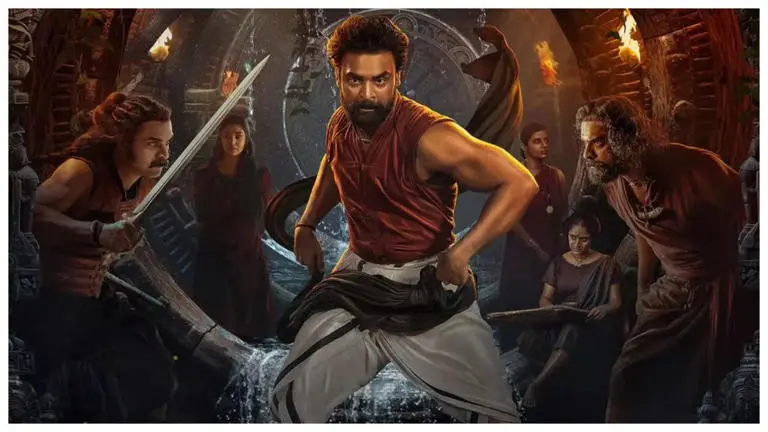Sujith Nambiar is the writer, and the overall plot sounds wonderful as a one-line or even a page. But the film has not been fleshed out.
Tovino Thomas plays three roles across three different time periods in Ajayante Randam Moshanam, or A.R.M. The first character (described as someone godly) sets the plot in motion by bringing in three aspects: (1) he is from an oppressed caste that is typically used and also abused (i.e., cheated) by those higher up in the social hierarchy, (2) he introduces us to a magical lamp that will play a part throughout this narrative, and (3) he is a warrior and so are his descendants, who move the main story. After this setup, the film moves in two parallel timelines, with Manian and Ajayan. A.R.M. is in 3D (though my show was in 2D), and so is Tovino. He gets to exercise different dimensions of his persona: the fighter from Godha, the animalistic brute from Kala, and the softer, gentler simpleton we have seen in Mayanadhi. His committed screen presence is the film’s strength.
There’s a fourth “hero” in A.R.M. (if you count Tovino as three), and that’s the cinematographer Jomon T John. Usually, when we go back in time, there is the tendency to hold back with the period look – maybe even “cheat” a bit to get brighter visuals more palatable to a modern-day audience. But Jomon (and director Jithin Laal) go all the way. The gorgeous frames look exactly like they have been lit by torches and oil lamps, with a lot of dim light and shadows. The effect is spectacular. (The action scenes would have been even better had they resisted the temptation to keep inflicting slo-mo on the frames.) The location scouting has yielded several beautiful locations, particularly one by a waterfall – and the combination of scenery and lighting is a treat. Even the modern-day portions are presented with a hint of watching a new print of a slighly older movie, given that it is the 1990s.
Sujith Nambiar is the writer, and the overall plot sounds wonderful as a one-line or even a page. But the film has not been fleshed out. The love interests played by Krithi Shetty and Aishwarya Rajesh and Surabhi Lakshmi, the villain played by Harish Uthaman – they are all generic placeholders who just do what the archetype would suggest. The love interests hang around the hero. The villain (from a dominant caste) seeks to oppress the hero. With a magical lamp in the mix, how much nicer would it have been to have this villain seek this object for… a truly magical reason. Even the power of the lamp is not used properly. There is a decent set piece that reminds us of the Indiana Jones films. It also reminds us that those films really showcased the value of those magical artifacts, so we knew why the villains wanted them so badly.

The fact that Ajayan owns an electronics shop is not used for anything other than a meet-cute with his lover and a conversation over ham radio. Later, in a strange bit, a cop says he overheard these conversations, and it amounts to nothing. (In an odd bit of casting, Aju Varghese plays this cop.) Or take Ajayan’s tuition classes, where he teaches children the fundamentals of the Constitution, like equality and so on. This character trait comes in just one scene, and again, it amounts to nothing. A voiceover at the beginning announces: “I am a traveller and time is my vehicle.” There’s not much in A.R.M. that lives up to the mythical grandness suggested by these words. There’s operatic grandness in Dhibu Ninan Thomas’s score, but, often, the energy of the scenes does not live up to the energy of the music.
A few patches of writing come off well. There is a nice way a fight ends up both as a defeat as well as a kind of victory. Ajayan’s decision to restore his family honour and especially give his mother (Rohini) the respect she deserves certainly needed better writing – but at least, there’s a semi-mythical feel in these scenes. Some parts of the sidekick character played by Basil Joseph aren’t bad. I saw the film in Tamil, and the lyrics by Krithika Nelson are lovely – not the usual “filler words” you find in dubbed films. Some of the transitions between past and present – between Maniyan and Ajayan – are solid. These are the best parts of A.R.M., and this is where the premise is truly exploited. A set piece above and under water, involving the lamp, is done really well. But for something with such a grand vision, something that tries to be an original combination of folklore and fantasy and myth, I wish the film had been more than just… generically watchable



Pingback: Jithin Laal’s ‘Ajayante Randam Moshanam’, with Tovino Thomas, is an easy, generic watch, but the premise deserved more | Baradwaj Rangan